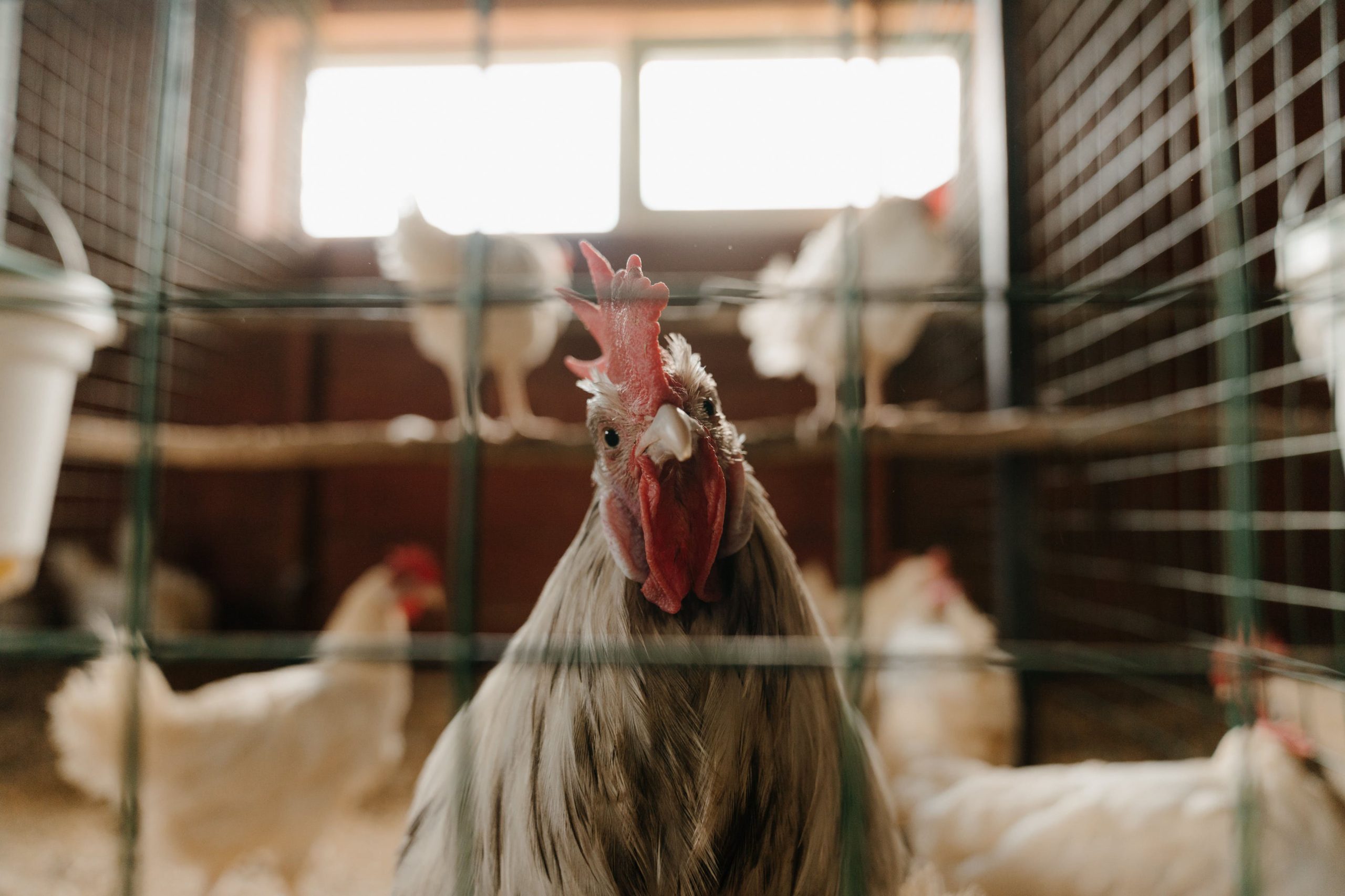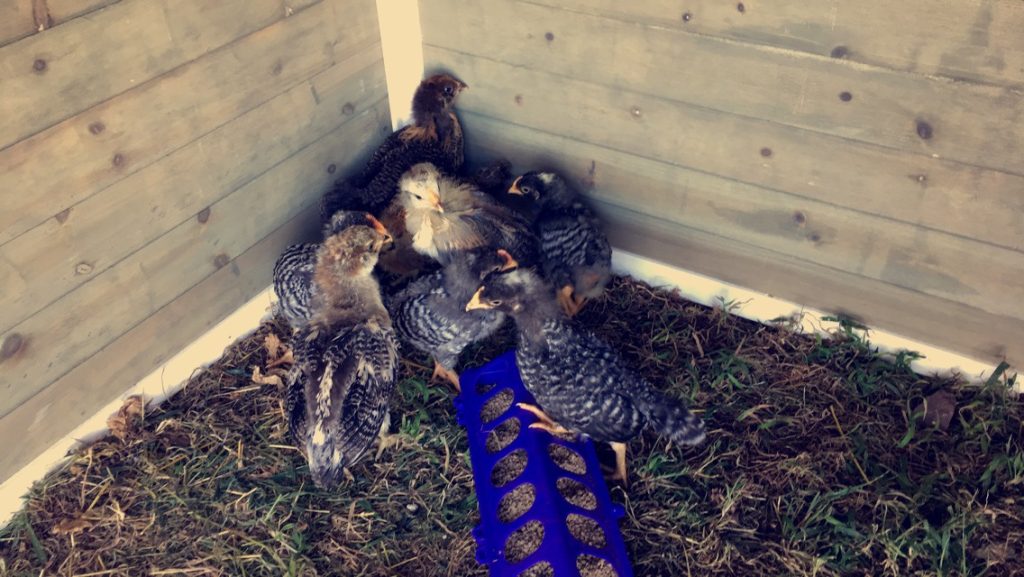What to know before starting a chicken flock

So, you’ve caught the backyard chicken bug…isn’t it fantastic? Although the chicks at the farm store are adorable and extremely tempting, there is some education that should be absorbed before you establish a flock. The first question to ask is if you are allowed to have chickens where you live. Those of us who live in rural areas have the freedom to have as many chickens as our hearts desire, but if you live in town, the rules may be different. Check with your city ordinances to find out for sure. Many cities allow hens, but not roosters, so that is an element to consider.
For anyone who does not know, a rooster is not needed for hens to lay eggs. They are only required for fertilized eggs for hatching out chicks and sometimes they will provide protection from predators. Although I’ve only had cowardly roosters that cause drama in the coop and run for the hills if a predator shows up.

Next, think about your options for a chicken coop or shelter. Keeping chicken safe from predators is one of the most crucial elements of chicken keeping and the coop you choose will probably depend on your location as well. There are several types of chicken coops. Static coops, which stay in one spot, or mobile chicken coops, which can be moved daily to allow chicken to forage with protection from predators.
Originally, I lived in town when I bought my first chicks and I had a small static coop that I bought from a local farm store. My chickens were confined unless I let them out for a few hours a day in my yard. Since I live in the country now, I have a large static coop and my chickens free-range during the day. They have access to the coop anytime they want to lay eggs or seek shelter and they are shut up in the coop at night. (To learn more about that coop building process, read my blog about building the coop of my dreams.)

However, be prepared for chicken droppings in undesired places and hens eating your plants if you opt for the free-range method. I know because I’ve experienced this, but I love to let my birds free-range, so the joy of seeing them foraging outweighs their messy annoyances.
If a static coop is large enough or has an attached run, chickens can be confined in it without the need for free-ranging. However, some common issues chicken owners can run into with this set up is more frequent coop cleaning and fighting among birds since they are cooped up all day together.
The mobile chicken coop is a great option for chicken keepers who cannot let their chickens free-range due to city ordinances or predators. It allows chickens to forage on grass and insects daily and prevents manure build-up. It is important to remember, there is no right or wrong answer when it comes to a chicken coop style. Choose the set up that fits your environment and needs.
The size of your coop dictates how many chickens can live in it. A good rule of thumb is to allow three to four square feet of living space per chicken. If your chickens are confined in the coop all day, they need 10 square feet of space per bid. Chickens like to roost or perch off the ground at night to protect themselves from predators and every coop should allow for at least 10 to 12 inches of roosting space for each chicken.
Good housekeeping
If you are keeping chickens to raise eggs, there should be designated laying boxes in the coop. The general rule is to have one laying box per four chickens, but often times there will be a favorite box that everyone will use. It is important to keep the box clean and collect eggs daily. If a hen purposely or accidentally breaks an egg and starts eating it, she may continue eating eggs. This is a hard habit to break once they start, so collecting them daily is the best prevention.


Bedding is another element to consider. Most people use wood chips or straw. Chicken droppings are 76% water, so they can be messy and you will want a material in the coop that can absorb that moisture. The bedding can also be placed in laying boxes for a comfy and soft place to lay eggs. As far as equipment, the basics can be found at any farm store and include a feeder, chicken feed (the appropriate ration for the age and type of birds) and a waterer that can hold enough water for your chickens for several days. No one wants to refill the water every day, trust me.
One piece of equipment I find extremely handy in the wintertime is a heated waterer. Small containers of water can freeze solid when the temperatures drop for several days and it is very difficult to keep the ice broken if your waterer is not heated. I love mine for that reason.
Another question I hear often from people interested in chickens is if heat is needed in the coop. If you have baby chicks, they do need to be under a head lamp or heat plate until their feathers fully develop, or about six weeks, but chickens beyond that age do not need a heat source and in certain cases providing a heat lamp can be dangerous.
Bedding can catch fire easily if a heat lamp is present and burn down the entire coop. Secondly, if you are using one due to particularly cold temperatures, if the electricity happened to go all the chickens would be at risk of dying from the extreme temperature change. It’s a risk I don’t take. Many breeds do fine in cold weather and I’ve never lost one to frigid temperatures. As long as they have food, water and shelter, they can exist in temperatures down to -20 degrees Fahrenheit.
Bringing the chickens home
Now that you’ve purchased the equipment and the coop is ready to go, it’s time to think about the chickens—the best part. In my opinion it is best to start small and add more hens as you get the hang of the chicken keeping business. Keep in mind, most hens will lay four to five eggs a week—except in the winter when there is less daylight and they molt. And remember, they will not start laying eggs until 18 weeks of age.
There are hundreds of breeds of chickens, so the sky is the limit when it comes to selecting birds. The best advice I can give is to do some research and select breeds that do well in your environment, are good layers and are friendly. My favorite breed is the Barred Rock. They aren’t the most beautiful breed, but every Barred Rock I have owned has been a great layer and a true friend. They sincerely love being around people and love to be held and petted. The one I have right now, Abigail, likes to ride on the mower with me and she is always the first to run up to me when I go out to the coop.

Additionally, it is important to remember the baby chicks at the farm store usually are not sexed. It is very difficult to differentiate a female from a male chick at a young age, so there are tons of cockerels among the pullets you are selecting from.
When I first started my chicken journey years ago, I bought eight chicks believing them all to pullets. The sales associate told me she could sex them, so I trusted her. I ended up with five roosters and three hens! What an ordeal that was, especially since I couldn’t allow them to free range all day due to my location. Fighting amongst the roosters happened daily and I ended up taking all the roosters to a petting zoo. I learned an important lesson from that experience!
One way to ensure you are receiving female chickens is to find sexed pullets or to purchase hens that are older and unmistakably female. To learn more about one farm that offers this service, check out my HPJ article about Leird Farms. They offer sexed pullets that are well taken care of and ready to start laying eggs at 18 weeks.
Sign up for HPJ Insights
Our weekly newsletter delivers the latest news straight to your inbox including breaking news, our exclusive columns and much more.
Lastly, it is imperative that those who are contemplating chicken ownership understand the responsibility it requires. They are so cute at the store, but these birds grow up and have to be fed and watered daily. They are living, breathing animals. They poop, a lot, and although cleaning the coop is not the most glorious aspect of chicken ownership, cleanliness is crucial to the health of your chickens.
The bottom line is you’ve got to be willing to scoop the poop to collect the eggs. However, ask just about any chicken owners and they will say the happiness, entertainment and eggs that are obtained from backyard birds far outweigh the dirty jobs involved with keeping them, which is why so many people have fallen in love with chicken keeping.
Lacey Vilhauer can be reached at 620-227-1871 or [email protected].



